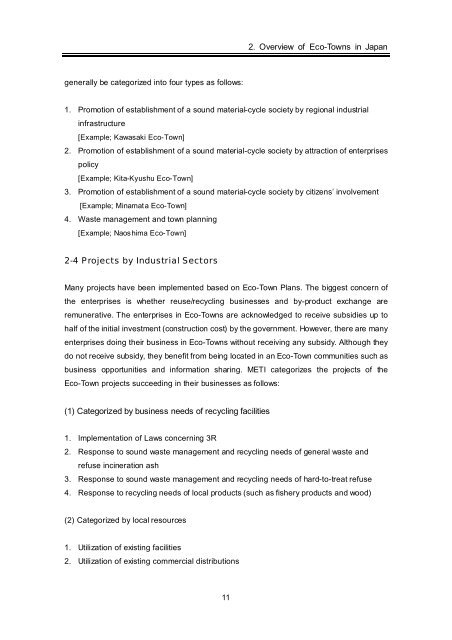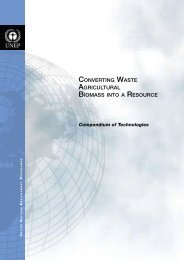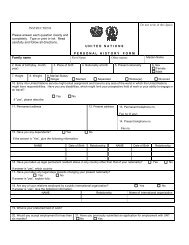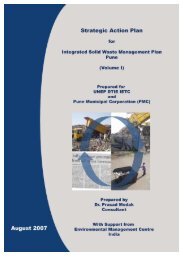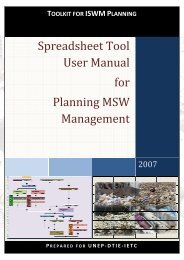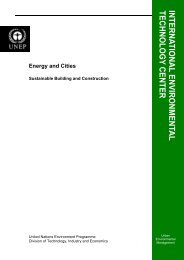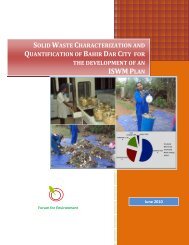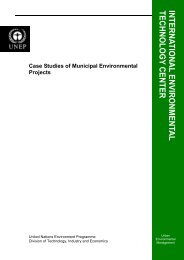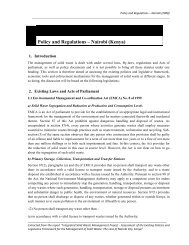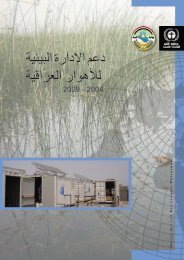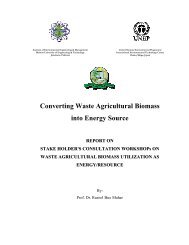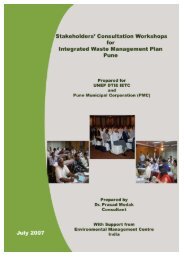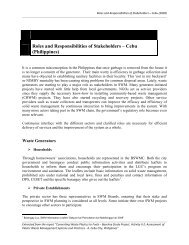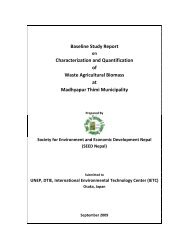Research on Eco-Towns in Japan - UNEP
Research on Eco-Towns in Japan - UNEP
Research on Eco-Towns in Japan - UNEP
Create successful ePaper yourself
Turn your PDF publications into a flip-book with our unique Google optimized e-Paper software.
2. Overview of <strong>Eco</strong>-<strong>Towns</strong> <strong>in</strong> <strong>Japan</strong><br />
generally be categorized <strong>in</strong>to four types as follows:<br />
1. Promoti<strong>on</strong> of establishment of a sound material-cycle society by regi<strong>on</strong>al <strong>in</strong>dustrial<br />
<strong>in</strong>frastructure<br />
[Example; Kawasaki <strong>Eco</strong>-Town]<br />
2. Promoti<strong>on</strong> of establishment of a sound material-cycle society by attracti<strong>on</strong> of enterprises<br />
policy<br />
[Example; Kita-Kyushu <strong>Eco</strong>-Town]<br />
3. Promoti<strong>on</strong> of establishment of a sound material-cycle society by citizens’ <strong>in</strong>volvement<br />
[Example; M<strong>in</strong>amata <strong>Eco</strong>-Town]<br />
4. Waste management and town plann<strong>in</strong>g<br />
[Example; Naos hima <strong>Eco</strong>-Town]<br />
2-4 Projects by Industrial Sectors<br />
Many projects have been implemented based <strong>on</strong> <strong>Eco</strong>-Town Plans. The biggest c<strong>on</strong>cern of<br />
the enterprises is whether reuse/recycl<strong>in</strong>g bus<strong>in</strong>esses and by-product exchange are<br />
remunerative. The enterprises <strong>in</strong> <strong>Eco</strong>-<strong>Towns</strong> are acknowledged to receive subsidies up to<br />
half of the <strong>in</strong>itial <strong>in</strong>vestment (c<strong>on</strong>structi<strong>on</strong> cost) by the government. However, there are many<br />
enterprises do<strong>in</strong>g their bus<strong>in</strong>ess <strong>in</strong> <strong>Eco</strong>-<strong>Towns</strong> without receiv<strong>in</strong>g any subsidy. Although they<br />
do not receive subsidy, they benefit from be<strong>in</strong>g located <strong>in</strong> an <strong>Eco</strong>-Town communities such as<br />
bus<strong>in</strong>ess opportunities and <strong>in</strong>formati<strong>on</strong> shar<strong>in</strong>g. METI categorizes the projects of the<br />
<strong>Eco</strong>-Town projects succeed<strong>in</strong>g <strong>in</strong> their bus<strong>in</strong>esses as follows:<br />
(1) Categorized by bus<strong>in</strong>ess needs of recycl<strong>in</strong>g facilities<br />
1. Implementati<strong>on</strong> of Laws c<strong>on</strong>cern<strong>in</strong>g 3R<br />
2. Resp<strong>on</strong>se to sound waste management and recycl<strong>in</strong>g needs of general waste and<br />
refuse <strong>in</strong>c<strong>in</strong>erati<strong>on</strong> ash<br />
3. Resp<strong>on</strong>se to sound waste management and recycl<strong>in</strong>g needs of hard-to-treat refuse<br />
4. Resp<strong>on</strong>se to recycl<strong>in</strong>g needs of local products (such as fishery products and wood)<br />
(2) Categorized by local resources<br />
1. Utilizati<strong>on</strong> of exist<strong>in</strong>g facilities<br />
2. Utilizati<strong>on</strong> of exist<strong>in</strong>g commercial distributi<strong>on</strong>s<br />
11


